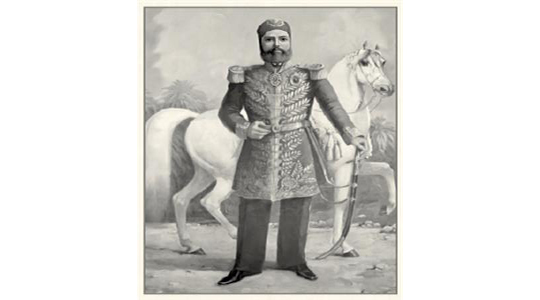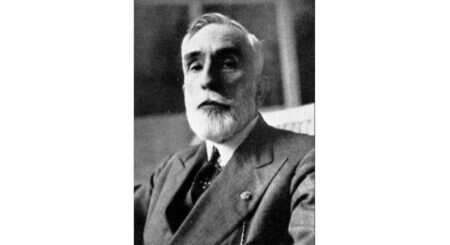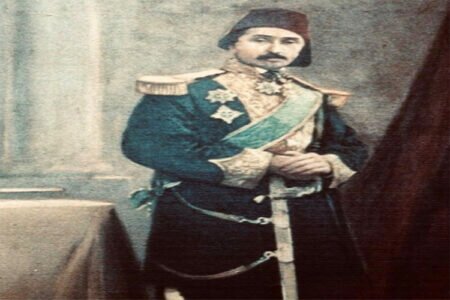Researchers, scholars, and those interested in the field of purebred Arabian horse breeding and care realize that Abbas Pasha I occupies a unique position in this field. For his great and unprecedented efforts in establishing the “Kingdom of Egyptian Horses”.
Abbas Pasha I was born in the city of “Jeddah”, one of the governorates of the Makkah Al-Mukarramah region, in the Kingdom of Saudi Arabia, in 1228 AH, corresponding to 1813 AD.
His father was Ahmed Toson Pasha, the son of Muhammad Ali Pasha, and his mother was “Bamba Qadin”, whose name means “The Pink”.

Abbas Pasha held a number of important positions in Egypt and Sudan before becoming the third ruler of Egypt. He was interested in establishing a new city in the Redaniyah desert, which he called the Abbasid, inhabited by the dignitaries and the wealthy. He built the seven palaces there, and attached to each palace a stable for horses, later known as the Seven Saraya.
He built a huge palace with 2,000 windows, according to the narration of “Ferdinand De Lesseps”, who mentioned that he saw this palace in 1855 AD.
Egyptian horse
No one can ignore the fact that Abbas Pasha I is rightly the founder of the Egyptian horse kingdom. Prince Muhammad Ali Tawfiq talks about that important period in the life of his grandfather Abbas Pasha, saying: “I have loved horses since my youth, and I started riding my horse since I was six years old, and my teacher was the Circassian Pasha who was sent by my late grandfather Abbas Pasha the First more than twenty times to buy an asset. Arab horses, and brought them to Egypt, so that it is said that the group of horses that belonged to Abbas Pasha I, only King Solomon won.
Tawfiq goes on to talk about his grandfather Abbas Pasha I and his relationship with horses, saying: Abbas Pasha had a strong relationship with the sheikhs of Arab tribes, and he had distinguished relations with many in the Arabian Peninsula and the Levant desert. A word everyone hears.
Why were the Europeans bragging about the stingy Abbas Pasha?
The quality of Abbas Pasha I’s horses reached the point that Europeans could be proud of. Abbas Pasha I had a great passion for collecting purebred Arabian horses, and this hobby made his friends strive hard to obtain horse gems that could not be sold or bought to present to him.
Everyone was seeking to build friendship and serenity relations with him, and this is what made him interested in calming conditions in the Arabian Peninsula, and direct intervention to solve some of the problems between its leaders, and this is what made everyone strive to have the best horses in Abbas Pasha’s stables.
Abbas Pasha allocated a number of camels; The “sons of horses” and foals are irrigated with their milk, and the most important advantages of camel milk is that it contains, unlike other animal milk, compounds of a protein nature such as lysozyme, anticoagulants, anti-poisoning, and antibacterials. A very important element in areas where fresh fruits and vegetables are not available, and this applies to the desert.
It is well-known on the authority of Abbas Pasha that he did not hear of a horse or a thoroughbred horse except that he sent to its owner a request to buy it, exhorting him with money, and multiplying it for him. He also bragged about his European horses, to the extent that the German Baron “Julius von Hegel”, head of the “Wuerttemberg” farm, who came to Cairo to buy Arab horses from Abbas Pasha for the benefit of King “Württemberg”, who established a stud for Arab horses in 1817, says in his memoirs about his interview Abbas Pasha: “He did not talk much about horses in front of strangers, lest they demand them from him.
And when I met him by chance with a crowd of his regrets, I tempted him to talk about horses in general, and he began to ask about the import of horses by Europeans, and then he touched upon the specifications and importance of Arab horses. After I answered his questions, he said: Although I am confident that you have succeeded in breeding purebred Arabian horses in Europe, you should not imagine that what was bred with you are purebred Arabian horses; Because there are qualities that the Arabian horse is not born with, but acquires them only as long as it breathes the desert air.
Abbas Pasha and the policy of acquiring horses in partnership
Abbas Pasha was keen on acquiring horses from their stables through partnership, as the Bedouins would give him the best of their horses, on the condition that they obtain a dowry or two dowries born from them. Were it not for this condition, the Bedouins would not have been satisfied with their horses, which they used to present to him in any way. At such times, Abbas Pasha would host the Bedouins and present them with gifts; Therefore, he strengthened his influence over the tribes a lot.
Abbas Pasha’s friendship with Prince Faisal did not prevent him from buying from him two valuable horses for imaginary sums, namely: a “woman” called “Jalabiya Faisal,” originally from Bahrain’s horses, given to Faisal bin Turki, and sent by him to Abbas Pasha, for which he paid four thousand pounds. And the second “Jazia” Saqlawiya of the Rolla horses.
The horse had the lion’s share of the interests of Abbas Pasha I, as he dealt with horses coming from the Arabian Peninsula with great interest and interaction, and acquired the best breeds, not only on the level of the Arabian Peninsula, but at the level of the whole world, and recommended his ministers to live in houses adjacent to an area later known as Abbasid ; relative to him.
He also overcame all the difficulties he faced in the reconstruction of the stables of the purebred Arabian horses belonging to his grandfather, Muhammad Ali, where he spent a million pounds in building the stables of Casablanca, which is located twelve miles from Cairo on the Suez Desert Road, whose traces still remain until now. It was built between 1850-1851 AD, and was provided with a water tank that was filled with water brought directly from the Nile on the backs of camels.
The place was cut off from people, and Abbas Pasha visited it from time to time, and no one knew what exactly was going on in this place; Because the area is surrounded by heavy security, it receives its orders from Abbas Pasha himself.
Abbas Pasha was keen to apply the Bedouin system in horse breeding; Therefore, his horses were trained near Heliopolis, Cairo, under the leadership of Bedouin experts from tribes known for their care of horses, such as: Otaiba, Mutair, Anza, Shammar, and Al-Hanadi. He entrusted them with managing the horse house in which he built his palace, so he made his balconies overlook the horse stable; So as not to lose sight of him






